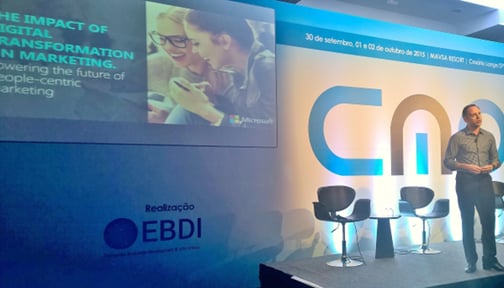The CMO's 5 B2B Marketing Priorities for 2025 and Beyond
As the B2B business environment rapidly transforms, Chief Marketing Officers (CMOs) need to be prepared to lead with a strategic vision that aligns with new market demands, changing technologies and corporate consumer expectations.
MARKETING


As the B2B business environment rapidly transforms, Chief Marketing Officers (CMOs) need to be prepared to lead with a strategic vision that aligns with new market demands, changing technologies and corporate consumer expectations.
For B2B companies, the role of the CMO is evolving, and in 2025 and beyond, they will need to focus on five essential areas that will ensure long-term success.
Here are the top 5 priorities for a CMO focused on B2B businesses:
1. Adopting Emerging Technologies to Drive Personalization and Automation
In the B2B world, where business relationships are complex and purchasing decisions involve multiple stakeholders, personalization at scale will be a growing priority.
B2B CMOs need to embrace emerging technologies such as artificial intelligence (AI), marketing automation, machine learning, big data, and predictive analytics tools to deliver more personalized and effective experiences to their business customers.
These technologies not only enable mass personalization, but also help with precise lead segmentation, targeted content creation, and sales cycle optimization, all of which are crucial factors for B2B success.
Priority: Invest in technological solutions that enable hyper-personalized, data-driven marketing.
Example: Using AI to segment prospects based on specific behaviors and send content and offers tailored to the needs of each corporate client.
2. Focus on Customer Experience (CX) and Omnichannel Journey
Customer experience is not only a differentiator, but a fundamental need in the B2B market. Companies are increasingly demanding, seeking fast, fluid and frictionless interactions throughout the entire purchasing journey.
The B2B CMO must ensure that the company offers an omnichannel experience, with seamless integration between sales and support channels — whether digital or physical — and continuous monitoring throughout the purchasing journey.
The key to success in B2B will be providing a consistent experience across all touchpoints, whether on a website, through emails, at events or in direct interactions with sales reps.
Priority: Create an integrated, customer-centric omnichannel journey, ensuring a seamless experience from first contact to sale and post-sale.
Example: Implement a robust CRM system to map and nurture relationships with leads and customers throughout the entire lifecycle.
3. Data-Driven Marketing for Informed Decision Making
In the B2B world, using data to understand customer needs and optimize campaigns will be a growing priority.
The B2B CMO needs to take a more strategic approach, using predictive analytics tools to predict purchasing behaviors, optimize market segmentation, and create more effective marketing campaigns.
Data-driven marketing means leveraging insights into customer behavior and interaction history to create relevant content and maximize return on investment (ROI).
Priority: Use data analytics to segment markets and deliver more effective, personalized campaigns.
Example: Create personalized content marketing campaigns based on detailed insights into customer behavior and industry trends.
4. Marketing and Sales Collaboration to Accelerate the Buyer Journey
In the B2B environment, collaboration between marketing and sales will be essential to improve lead conversion and accelerate the sales cycle.
The CMO needs to be committed to integrating marketing and sales, using tools and processes that help with lead nurturing, qualification and closing sales.
By aligning strategies and objectives across marketing and sales teams, companies can deliver a seamless and more efficient customer experience.
Priority: Integrate marketing and sales for a smoother purchasing journey and better lead qualification.
Example: Use marketing automation tools to qualify leads and deliver valuable content throughout the journey, facilitating the conversion of sales teams.
5. Social Responsibility and Sustainability as Part of the Value Proposition
The B2B market is increasingly aware of issues of social responsibility, sustainability and corporate governance (ESG).
The CMO of B2B companies needs to understand that companies are being evaluated not only on the quality of their products and services, but also on the social and environmental impact they generate. In 2025 and beyond, companies will need to clearly and authentically communicate their commitment to sustainable practices.
Companies that genuinely adopt these practices tend to stand out in the market, especially among customers and business partners who seek to associate with companies with values aligned with their own.
Priority: Integrate sustainable and socially responsible practices into the core of the company's value proposition.
Example: Create marketing campaigns that highlight the company's actions to reduce its carbon footprint, promote ethical governance practices, or support social causes.
Conclusion
In 2025 and beyond, the role of the B2B CMO will be challenging, but at the same time, a huge opportunity to transform the way companies connect with their customers and partners. Key priorities include:
Adoption of emerging technologies for personalization and automation at scale.
Creating an omnichannel customer experience, ensuring consistency across all touchpoints.
Using data for more informed decisions and more effective marketing campaigns.
Integration between marketing and sales to accelerate the purchasing journey and increase conversion rates.
Commitment to sustainability and social responsibility practices, as a strategic differentiator.
These priorities require B2B CMOs to become strategic leaders within their organizations, embracing an innovative, data-driven mindset while maintaining a focus on creating genuine value for customers and society at large.
See more articles
Featured Articles
Continue reading about B2B marketing


